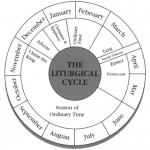“O come, O come, Emmanuel” is the Advent song. While Christmas carols have started invading our space — piped over loudspeakers in stores, and even on the streets in some places — “O come, O come, Emmanuel” isn’t a Christmas carol; it’s about the anticipation. It’s about Advent. Here’s the first verse (the one everyone knows) for the first week of Advent:
O come, O come, Emmanuel,
And ransom captive Israel,
That mourns in lonely exile here
Until the Son of God appear.Rejoice! Rejoice! Emmanuel
Shall come to thee, O Israel.
The words are based on Isaiah 7:14:
The Lord himself will give you a sign. Look, the young woman is with child and shall bear a son, and shall name him Immanuel.
I’d heard “O come” probably a hundred times before I really felt it. I connected with its beauty about five years ago, singing it at a Franciscan Friars of the Renewal Vespers service for Advent. There were about five hundred of us, in the dark, on our knees, singing it over and over for probably half an hour, and it entered me in a way that it hadn’t before. I became one with its ecstatic but restrained joy of expectation.
The song is very old — the words are a 19th-century English translation by John Mason Neale, but it uses the same exquisite tune as “Veni, veni, Emmanuel,” a 15th-century French plainsong hymn, which itself was based on an 8th-century Gregorian chant.
I missed the FFR service this year, but got to sing the hymn at St. Lydia’s on Sunday and am excited to learn we’ll be singing it each Sunday of Advent! If you want to know one of the reasons I’ve very lucky to be part of St. Lydia’s, check out this audio clip of our pastor, Emily Scott, singing “O Come” as part of an instructional series for song leaders.
The video version above is by Sugarland from a Christmas special. It’s not that I don’t love a straight-up choral version, but Jennifer Nettles has perhaps the most beautiful and pure female contralto voice in music today, and I enjoy how they gave it a hint of country without messing with the melody at all.
Of course the passage from Isaiah the song is based on is not only very well known but also very controversial. The translation I used above is from the New Revised Standard Version, the most accepted English bible translation among both Catholics and mainline Protestants worldwide. When its predecessor, the RSV, was published in 1952, it caused quite a stir by abandoning the traditional translation of the Hebrew almah as “virgin,” widely considered by biblical scholars to be wrong, opting instead for the term “young woman.” Needless to say, this has implications, as the Isaiah passage is then quoted in Matthew 1:21-23 to say that Jesus is the fulfillment of this prophesy that a savior would be born of a virgin. Perhaps we can talk more about that in a future post as Christmas approaches.
I’ll be posting many Advent-themed pieces over the next few weeks and you can see them all together at patheos.com/blogs/philfoxrose/tag/advent/. Please share this link, or just one to my blog, with anyone you think might be interested. Thanks!












